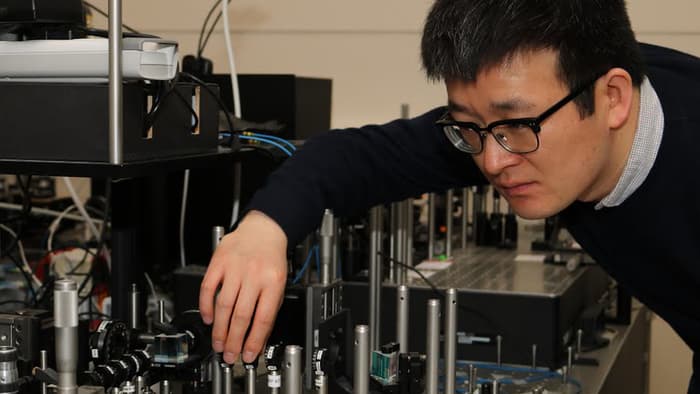
Quantum computers strive to tackle the problems that modern digital computers fail to solve, using superposition, entanglement, and other principles of quantum mechanics. A true quantum computer remains elusive, but as of the present, experiments have successfully been carried out using a minimal number of quantum units. One interesting bit of research demonstrates that even primitive quantum computers can outperform traditional modes of computing at specific tasks.
Researchers from the University of Bristol and the University of Western Australia are studying the processing capabilities of simpler designs as forerunners for large-scale quantum computers, which are “machine[s] designed to use quantum mechanics to solve problems more efficiently than any possible classical computer,” according to Dr. Ashley Montanaro of the University of Bristol’s School of Mathematics. An attempt to build a large-scale quantum computer has been a worldwide engineering challenge, requiring substantial effort from a wide range of experts, as it involves advanced technology ahead of its time. Final results could create speedy and cheap ways to design new materials and pharmaceuticals.
Surveying this research indicates that quantum machines could outperform the capabilities of classical computing for very particular purposes, contemplating the practicality of a model’s usefulness and how polished must it be to succeed. The speed with which modern computers solve problems is a quantum machine’s main concern, as scientists hope for it to resolve issues more efficiently. Quantum processors are currently used for research purposes, carrying a limited number of quantum computers’ building blocks, qubits (quantum bits). Putting together enough of these qubits in a machine remains one of the researchers’ top challenges in this process, but the data shows that quantum computers’ swift performance could occur sooner than anticipated.
So far, scientists have studied ways to use a basic quantum processor to demonstrate what is known as the quantum walk, a mechanical analog of the “’drunken sailor’s’ walk, where the current state of a walker staggering along is described by a probability distribution (a probability assigned to each possible direction of movement in a given space) over positions.” Providing a display of movement possibilities in a finite set, these studies show alternative ways to think about the potential of full-scale quantum computers and develop new, helpful quantum algorithms.
“An exciting outcome of our work is that we may have found a new example of quantum walk physics that we can observe with a primitive quantum computer, that otherwise a classical computer could not see,” explained Dr. Jonathan Matthews, EPSRC Early Career Fellow and Lecturer in Bristol’s School of Physics and the Centre for Quantum Photonics. “These otherwise hidden properties have practical use, perhaps in helping to design more sophisticated quantum computers.”
Source: University of Bristol
Advertisement
Learn more about Electronic Products Magazine





